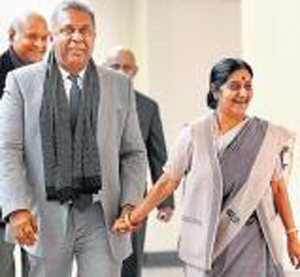Delhi denies RAW official’s expulsion from Colombo
Mangalore Today News Network
New Delhi/Colombo, Jan 19, 2015, DHNS: India on Sunday denied reports that an intelligence official was transferred from Colombo after New Delhi received complaints from the then Sri Lankan president Mahinda Rajapaksa that the officer was helping the Opposition in the recent election. “All information on postings and transfers are in the public domain. The normal tenure of an Indian diplomat in Sri Lanka is three years, and all officials who have been transferred over the past year have completed it. It’s a normal transfer,” said Ministry of External Affairs (MEA) spokesman Syed Akbaruddin in New Delhi.
“All information on postings and transfers are in the public domain. The normal tenure of an Indian diplomat in Sri Lanka is three years, and all officials who have been transferred over the past year have completed it. It’s a normal transfer,” said Ministry of External Affairs (MEA) spokesman Syed Akbaruddin in New Delhi.
“Do not read anything into it unless somebody stands up and says ‘yes’. Using unnamed sources is just obscuring the truth. Take my view as the last word,” he said. Asked if the MEA was denying the report, he replied in the affirmative.
Meanwhile, Rajapaksa, voted out of office in the January 8 election, said he did not know all the facts, while the new government in Colombo said it was aware of the reports but could not confirm them.
New Delhi’s denial of the incident comes after a three-hour meeting between External Affairs Minister Sushma Swaraj and his Sri Lankan counterpart Mangala Samaraweera. A sketchy report in Sri Lanka’s “Sunday Times” newspaper on December 28 had said “links with the common Opposition” had cost the Research and Analysis Wing (RAW) station chief in Colombo his job.
He was accused of facilitating meetings to encourage several lawmakers, Sirisena among them, to defect from Rajapaksa’s party.
The agent was accused of playing a role in convincing the main leader of the Opposition, Ranil Wickremasinghe, not to contest against Rajapaksa, and stand aside for someone who could be sure of winning, said the officer and a Sri Lankan lawmaker who also maintains close contacts with India.
The agent was also in touch with former president Chandrika Kumaratunga, a key player in convincing Sirisena to stand, said the officer. Former president Kumaratunga did not respond to requests for comment.
Rajapaksa’s unexpected defeat after two terms in office coincided with growing concern in India that it was losing influence in Sri Lanka because of the former president’s tilt toward regional rival China.
The concern turned into alarm late last year when Rajapaksa allowed two Chinese submarines to dock in Sri Lanka without warning New Delhi, as he should have under a standing agreement, said the sources.
- Two booked for abusing, misbehaving with doctor on duty at hospital in Puttur
- Udupi-Bengaluru private bus catches fire in Mandya; passengers safe
- Vittal: Decomposed body of Paltaje resident found in isolated spot
- We are in favor of peace, Union Govt must strengthen security measures says Siddaramaiah
- 3 Pak women residing in City Police Commissionerate limits
- All-religion meet pays homage to late Pope Francis
- Pahalgam attack: DK Congress holds candle light vigil
- Tirthahalli student Deeksha scores 600/600 in II PU after revaluation, tops science stream in Karnataka
- Kudremukh trekking circuits to reopen from May 1
- Two medical students of Tiruchi SRM Medical College drown in Arabian Sea at Gokarna
- KS Hegde Hospital achieves landmark success with three complex Carinal Resection Surgeries for lung cancer
- Mangaluru: Facebook page booked for supporting Pahalgam massacre; probe underway to trace admin
- Nitte Institute of Hospitality Services: 33 years of excellence in shaping hospitality professionals
- 280 injured, several feared dead after explosion tears through Iran’s Bandar Abbas port
- Two ATM robbers shot at in Kalaburagi
- Blood will flow if India stops river water, Bilawal Bhutto threatens
- Not a drop of water to Pakistan, says Jal Shakti Minister
- Ranya Rao charged under anti-smuggling law, to be detained for year: Sources
- Houses of 5 terrorists across J&K razed days after Pahalgam attack
- Strong message from UN Security Council after Pahalgam terror attack
- Pakistan continues unprovoked firing along LoC; Indian Army responds
- Kashmir on high alert after intel warns of terror plots targeting non-locals, rail network
- Supreme Court pulls up Rahul Gandhi over Savarkar remark, stays HC order
- Former ISRO chief K Kasturirangan passes away in Bengaluru
- Identify all Pakistanis in India, send them back: Amit Shah to Chief Ministers
- Skills and Competencies Take Center Stage at MSN Dialogue Series
- Court remands Maoist Lakshmi to six-day police custody
- Sandhya Shenoy honored with Society for Materials Chemistry Medal-2024
- White Cornus Apartment in Mangaluru
- City girl wins first place in state-level spell bee competition
- Alleged ‘Love Jihad’ Case in Mangaluru: Woman left home voluntarily, says police
- Girl fatally struck by reckless two-wheeler near Belman
- New residential complex for the judges inaugurated in Mangaluru
- Absconding accused nabbed after 8 years
- Truck with cylinders turns turtle in Beltangady
- Bhoota Kola artist dies of cardiac arrest
- Development of the country should be our goal: Ganesh Karnik
- Container truck gets stuck under Modankap railway bridge
- Truck crushes bike’s pillion rider near BC Road
- Head constable dies of heart attack
- CITY INFORMATION
- TRAVEL
- TOURIST INFORMATION
- HEALTH CARE
- MISCELLANEOUS




 Write Comment
Write Comment E-Mail To a Friend
E-Mail To a Friend Facebook
Facebook Twitter
Twitter  Print
Print 


